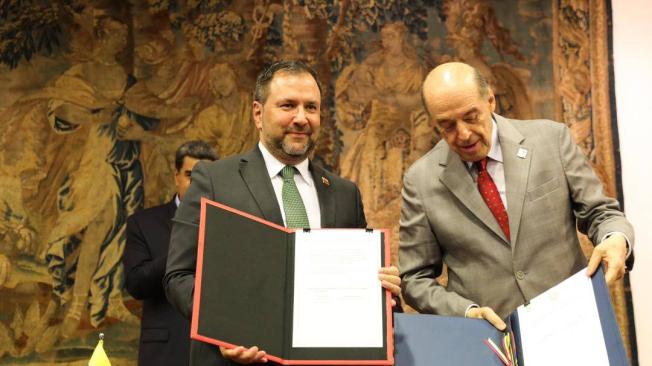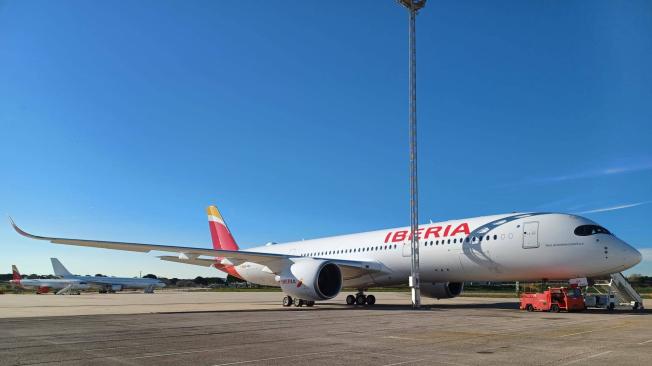The consequences of a break in relations between Venezuela and Spain
Relations between Spain and Venezuela are on Friday in what seems to be the prelude to a possible break after Caracas called its ambassador in Madrid for consultations due to questions regarding the reelection of Nicolás Maduro and the asylum that will be granted in that country to his opposition rival, Edmundo Gonzáles Urrutia.
Venezuelan Foreign Minister Yván Gil announced on his social media the decision to “call for consultations” his ambassador in Madrid, Gladys Gutiérrez, in response to statements by the Spanish Minister of Defense, Margarita Robles, who called Maduro’s government a “dictatorship” during the presentation of a book in Madrid, where she also referred to Venezuelans who have left their country “victims of restrictions, violence, lack of democracy and lack of freedom.”

Yvan Gil (left). Photo: Press Office of the President of Colombia
Gil also reported that he summoned the Spanish ambassador in Caracas, Ramón Santos, “to appear” this Friday at the headquarters of the Ministry of Foreign Affairs.and described Robles’s words as “insolent, interventionist and rude.” The diplomat did indeed arrive at the Foreign Ministry headquarters, but did not make any statements to the press.
Gil did make statements. According to what he wrote on his Telegram channel, he told the Spanish ambassador in Caracas that his country will not allow any “interference in matters that are the exclusive responsibility of Venezuelans.”
It is not, however, the first diplomatic crisis facing Caracas following the presidential electionsFollowing the questioned results of the July 28 election, Nicolás Maduro’s government withdrew all diplomatic personnel from the embassies of Argentina, Chile, Costa Rica, Peru, Panama, the Dominican Republic and Uruguay, countries that questioned his re-election and called for the electoral records to be made public.
The origin that unleashed the tension between Venezuela and Spain
Tensions in relations between Caracas and Madrid have increased in recent days after Venezuelan opposition leader Edmundo González Urrutia arrived in Spain on Sunday to request asylum after a month in hiding in his country.
This Wednesday, at the proposal of the conservative opposition, The Spanish Congress of Deputies called on Pedro Sánchez’s government to recognise González Urrutia as the winner of the July 28 elections against Maduro.
In response, the president of the Venezuelan Parliament, Jorge Rodríguez, proposed breaking diplomatic, consular and commercial ties. “Let all representatives of the delegation of the government of the Kingdom of Spain and all consulates and all consuls leave here and we will bring our own from there!” said Rodríguez.

The head of the Venezuelan National Assembly, the official leader Jorge Rodríguez. AFP
Sánchez’s government does not recognize the victory that Maduro claims in the elections, nor that of his rival, and has insisted, in line with the position of the European Union, on demanding that the electoral records be published, which the opposition claims prove its victory.
As things stand, Spain will not recognise González Urrutia as the elected president of Venezuela, at least for now.
However, Sánchez received González Urrutia on Thursday at the La Moncloa palace, the seat of the presidency in Madrid, and assured that “Spain continues to work in favour of democracy, dialogue and the fundamental rights of the brotherly people of Venezuela.”
Madrid tries to tone down the escalation
The Spanish government on Friday decided to lower the escalation of tensions and described as “sovereign” the decision of Nicolás Maduro to summon the Spanish ambassador in the country and call his representative in the Spanish capital for consultations.
“Summoning an ambassador and calling for consultations are sovereign decisions of each State and therefore, there is nothing to comment on,” was the only comment made by the Spanish Minister of Foreign Affairs, José Manuel Albares, in an interview with the public channel. National Radio.
The Spanish government has not commented on Minister Robles’ comments, but that They have been applauded by the right in that country because they are “the pure truth,” in the words of the leader of the conservative Popular Party, Esteban González Pons, who has even gone so far as to ask for the withdrawal of the Spanish ambassador in Caracas.
The head of Spanish diplomacy, for the time being, insisted on the Executive’s desire to seek “the best possible relations with the brotherly people of Venezuela” and to look after the interests of the community and national companies in the country.

Prime Minister Pedro Sánchez talks with Venezuelan opposition leader Edmundo González (left) at La Moncloa Palace in Madrid. Photo: Pool Moncloa. EFE
The consequences of a relationship breakup: what areas would be affected?
It should be clarified that, indeed, Any country is free to decide whether or not to maintain diplomatic relations with another, so diplomatic and economic relations can be broken if there are considered reasons for doing so.
But then, what would happen if relations between Venezuela and Spain were to break off?
The first thing that would happen is the closure of embassies and consulates, which would make it difficult for citizens of both countries to carry out such procedures. That, of course, although not the only one, is perhaps the greatest fear.
An estimated 280,000 Venezuelan citizens live in Spain, including several opposition leaders. The figure does not include those with dual nationality. But the significant number of Venezuelans residing in the European country is undeniable: in the first quarter of 2024, data from the Spanish government indicated that Venezuelans were the third nationality with the most arrivals in the European country, with 22,600 migrants.
On the other hand, There are currently more than 130,000 people with Spanish passports residing in Venezuela.

Venezuelans await the arrival of Edmundo Gonzalez at the military airport in Torrejon de Ardoz, Spain. Photo: AFP
Other consequences would be on the economic level. Experts point out, for example, that breaking relations with Spain would have serious consequences for Venezuela, since at least until July of this year it was estimated that more than 120 Spanish companies had a presence in the neighbouring country, of which 60 are multinationals, according to the Spanish Institute of Foreign Trade.
Spain is the second largest investor in Venezuela. Among the Spanish companies established in the neighbouring country are Acciona Construcción SA, Blackfin Europa SL, Comins Global Corporation SL, Abanca and others such as Repsol, Telefónica, BBVA, Hesperia Hoteles, Mapfre Seguros, Zara and Meliá, which have invested around 500 million euros in the country.
According to the most recent data from the Observatory of Economic Complexity (OEC), corresponding to 2022, Venezuela ranked 99th among Spain’s largest exports, while Spain was the third destination for Venezuelan exports.
Specifically, at the end of the last reported year, Spain exported to Venezuela a total of 127 million dollars, equivalent in euros, with a varied basket of products that had unglazed ceramics as the main item, with a total of 9.63 million dollars.
And Venezuela, for its part, exported to Spain a total of 518 million dollars, equivalent in euros, of which 84.17% were generated by oil sales, which amounted to 436 million dollars.

Oil extraction (reference photo). Photo: Jaime Moreno/EL TIEMPO Archive
For experts, the trade balance has been favorable to Venezuela, with an upward trend over the last two years. This trade flow could be seriously affected in a scenario of a breakdown in relations between the two countries.
Data for June this year show that Spain exported 20.30 million dollars to Venezuela, while Caracas sold 188.61 million dollars in the European country.
On an interannual basis, Spanish exports to Venezuela rose by 64.9%, while Venezuelan foreign sales to Spain more than doubled by 186%, according to the Observatory of Economic Complexity, which attributes the increase in Venezuelan exports to Spain to increases in sales of crustaceans, iron reductions, liquors, copper derivatives and charcoal.
Additionally, with the proposal of the president of the Venezuelan Parliament to break relations with Madrid, the air connection between both countries would also be affected, and this could negatively impact thousands of passengers if one takes into account that Madrid has been functioning as the great gateway to Europe and is a strategic route within the Venezuelan aeronautical market.

Iberia plane. Photo: X: @Iberia
Currently, there are 14 airlines flying from Spain to Venezuela. “Along with Colombia, Spain is currently the country most connected to Venezuela in terms of airlines operating the route: two Venezuelan airlines and three Spanish ones,” explains the lawyer specializing in Aeronautical Law, Rodolfo Ruiz.
Specifically, the operation of airlines such as Estelar, Plus Ultra, Iberia, TAP Air Portugal and Conviasa would be affected.
A break with Madrid would worsen the difficult situation already faced by Caracas in terms of international air connections – also limited by sanctions imposed by the United States – which, according to the Venezuelan Association of Airlines (ALAV), was reduced by 54% this month after the suspension of commercial flights with Panama, the Dominican Republic and Peru last month.
How likely is a break in relations between Venezuela and Spain?
For Venezuelan opposition leader Juan Pablo García The crisis will not worsen because “the Maduro regime is not interested in breaking relations with Spain, nor is Spain interested in breaking relations with Venezuela.”
“The diplomatic crisis is nothing more than a way of diverting attention from what is really important, that is, the need for Spain to recognize Edmundo González as president-elect,” said García, a member of the leadership of the Vente Venezuela (VV) movement.
For her part, internationalist Mirna Yonis sees no possibility of a break-up and predicts an end to tensions thanks to diplomacy. Yonis also clarifies that the decision of the Spanish Parliament does not mean an official position of the Spanish State or the Prime Minister, Pedro Sanchez.
“It is important to first recognize how public powers are handled in other countries, in this case Spain. What was seen in the Congress of that country was only an invitation, not binding, and the Executive is the one who ultimately decides what to do and what not to do,” said Yonis.
*The Grupo de Diarios América (GDA), to which El Nacional belongs, is a network of leading media founded in 1991, which promotes democratic values, independent press and freedom of expression in Latin America through quality journalism for our audiences.
